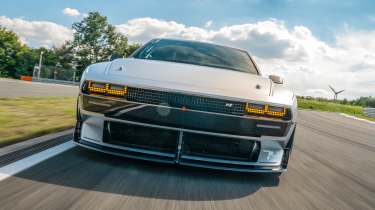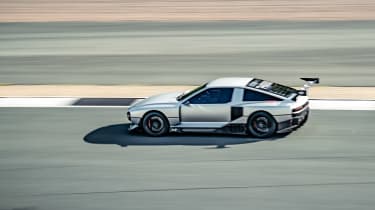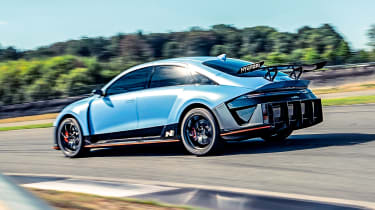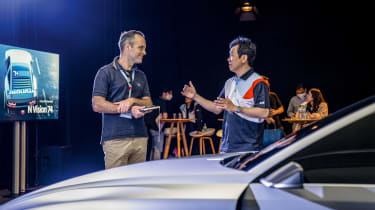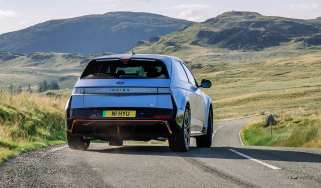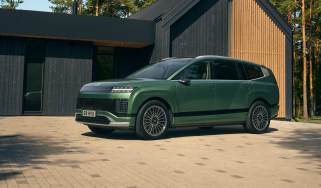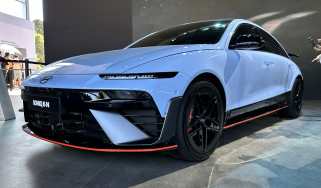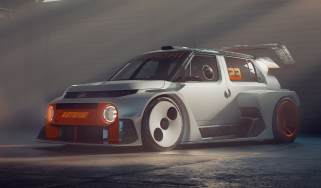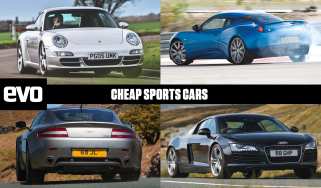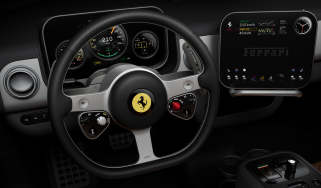The future of Hyundai N
The shift away from internal combustion needn’t mean the end of truly fun cars. That’s the message Hyundai is sending out with its latest N Vision 74 and RN22e concepts. We drive them
The drift goes on and on, and it’s not like anything I’ve felt before. Time seems to have slowed right down, so I have more than enough of the commodity to ponder what ICE car could do something like this. Maybe one of those wild professional drift cars: a 3-series Compact with an S85 V10 from an old M5, and a rear diff set up purely for the task of drifting; something that could snap fully sideways purely under power in a fast, gentle curve, then stay there while the rears are bonfiring almost for eternity. Like this N Vision 74 just has.
What makes this all the more surreal is that there’s no screaming V10, or ludicrously boosted straight-six for that matter, audible in the cockpit, but rather the sound of a hair dryer and very little else. A hair dryer? Read on…
> Hyundai RN22E concept review – forebear to the Ioniq 6 N
evo has come to the Bilster Berg circuit in Germany to drive both the Hyundai N Vision 74 and its slightly less spectacular but no less important brother, the RN22e. And before you close the page in disgust at the thought of reading about two concept cars with electric motors, may I suggest you don’t, because what’s contained within them, and the spirit in which they’ve been created, is very pertinent to our branch of motoring indeed.
The N Vision 74 is the crazy-looking retro coupe that I’m told nearly broke the internet when it was released, and has subsequently put its maker under huge – but surely welcome – pressure to make something that looks vaguely like it. But more on that car in a moment, because first it’s the turn of the slightly more conventional RN22e – or Rolling lab, N, 2023, electric – the latest in a sequence of prototypes that have trialled EV powertrains in N form. This one is based on the very distinctive body of the Hyundai Ioniq 6 electric saloon, which like the Ioniq 5 is built upon the company’s latest 800V E-GMP platform and features motors on the front and rear axles (making it the first 4WD N car), producing 215bhp and 362bhp respectively for a combined power output of 577bhp, backed up by 546lb ft of torque, all from a 77.4kWh battery.
Those are big numbers, if not necessarily by EV standards, but a bigger reason why you should care about this concept is that it shares that drivetrain with next year’s Ioniq 5 N, which is set to be the world’s first true EV hot hatch. It includes a new twin-clutch type of rear differential, known as eTVTC, so chosen because it enables an immediacy of response that is ideal when faced with an electric motor’s fierce and instant torque delivery.
The RN22e goes further, however. Think of it as a kind of EV touring car racer: it certainly looks the part, and it will indeed take over Hyundai’s entry into the ETCR, making it the first dedicated-platform EV racer in the championship (Hyundai currently uses an i30 N TCR with an electric powertrain fitted). It is also a development mule for a couple of more creative technologies instigated in part by Albert Biermann, the man behind the creation of Hyundai’s N department but now semi-retired and retained as a consultant. Biermann is a passionate believer that manufacturers are going to need to be imaginative when it comes to retaining their cars’ driver appeal in the face of electrification, and that simply big performance and stop and go pedals are not enough to create a true enthusiast car.
> Hyundai i30 N TCR race car review - what it's like to drive the road car-based racer
To that end he’s taken the artificial noise programme Hyundai was developing and applied it to the concept, complete with vibrations inside the car, to inject some sense of character into what could all too easily be seen as white goods. It’s hard to pinpoint exactly what it sounds like, but it really does make a cyber-muscle-car noise, inside and out, even from a distance. It’s more effective than it, er, sounds, if you’ll excuse the pun.
The other technology is N e-shift, which is an entirely virtual gearshift aimed at boosting driver involvement. In effect, the ultimate power of the motors is held back slightly, and then interrupted momentarily when the driver clicks the paddle behind the wheel, before the full power is brought in with a bump to mimic the next ‘gear’ meshing. The car is slightly slower with the tech switched on, but I’m told it’s worth it. Only one way to find out...
Despite weighing two tons the RN22e is impressive on the circuit. The acceleration stings, and it’s surprisingly deft into and out of corners, doing a good job of disguising its weight and even indulging in some power oversteer on the exit. The engineers have done a lot of work on guaranteeing the cooling of the powertrain, and are confident that this would be an EV that you could genuinely take on a trackday, helped by the fact that on the right charger it can go from 10 to 80 per cent charged in just 18 minutes.
As for the virtual shifts, they feel like a promising idea that still requires more development. It reminds me of the old SMG II ’box in an E46 M3 (single-clutch automated) in that on upshifts there’s a noticeable pause before the next gear drops in – the nodding dog effect. Then on downchanges it seems to wait for an unnecessarily long time before the computer will allow a shift. Still, it does give the brain more to think about, which is entirely the point.
On to the N Vision 74, and it’s not difficult to be swept up by the emotive backstory to the car. The inspiration comes from Hyundai’s very first homegrown car, the Pony of 1974. This was styled by the legendary Giorgetto Giugiaro of Italdesign, and alongside his saloon was another design for a coupe variant. The emergent manufacturer didn’t have the resources to bring the coupe to life, however, but something similar did eventually appear in the form of the DeLorean DMC‑12, also the work of Giugiaro.
> Lexus in development of a manual transmission for electric cars
Think of Back to the Future and now look at the N Vision 74… It’s not hard to see where the inspiration has come from. When it drives past it is genuinely jaw-dropping, and what’s on the inside doesn’t disappoint either, because this prototype uses Hyundai’s latest hydrogen fuel cell technology, effectively mixing the fuel cell stack, a battery and an electric motor to suit the prevailing traffic and driving style. There are no set rules, but think EV for urban, cell for cruising, and EV boosting the cell’s output for ultimate performance (much like the British Viritech Apricale in evo 294). The 114bhp stack is mounted at the front, the T-shaped 62.4kWh battery in the middle, and at the rear there are two 2.1kg hydrogen tanks and two electric motors driving the rear wheels only. Total power output is 670bhp and torque 662lb ft, and while it’s no lightweight at around two tons, the N Vision 74 reaches 62mph from rest in under 4 seconds, exceeds 155mph and has a range of over 373 miles.
Driving it is fascinating. The aforementioned hair-dryer sound is air being pumped over the stack, and the view through the shallow angle of the windscreen is suitably exotic. It feels big, wide and low, with an initial amount of body roll just enough to let you know where you are with it. The weight bias is like a 911’s, and you can feel it with some loads through the chassis. The 74 is, obviously, very quick, but the real fireworks are in drift mode, because with torque vectoring on the rear axle thanks to a motor per wheel, the car can do things that feel both completely alien and utterly hilarious at the same time. It’s a hooligan-like but joyous way to experience a cutting edge piece of technology that may just be in our futures.
And that’s the point, really. Precious few other companies are meeting the demands of a sustainable future yet still trying to keep the thrill of driving alive like Hyundai is. The N department has had a very quick rise to prominence and created some of our favourite cars of recent years. These two concepts suggest it will be at the forefront of our motoring enjoyment in the years ahead.
This story was first featured in evo issue 302.

